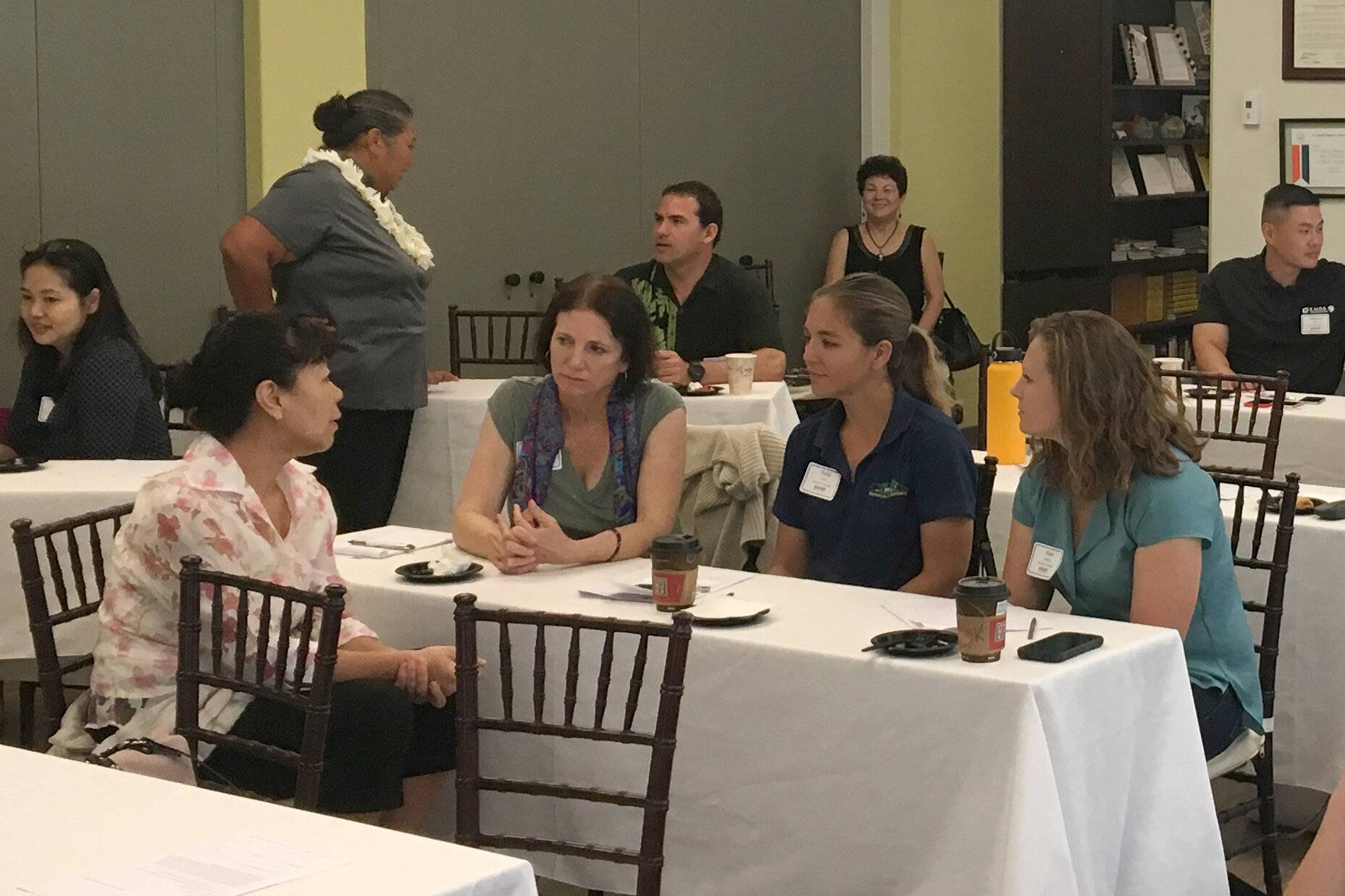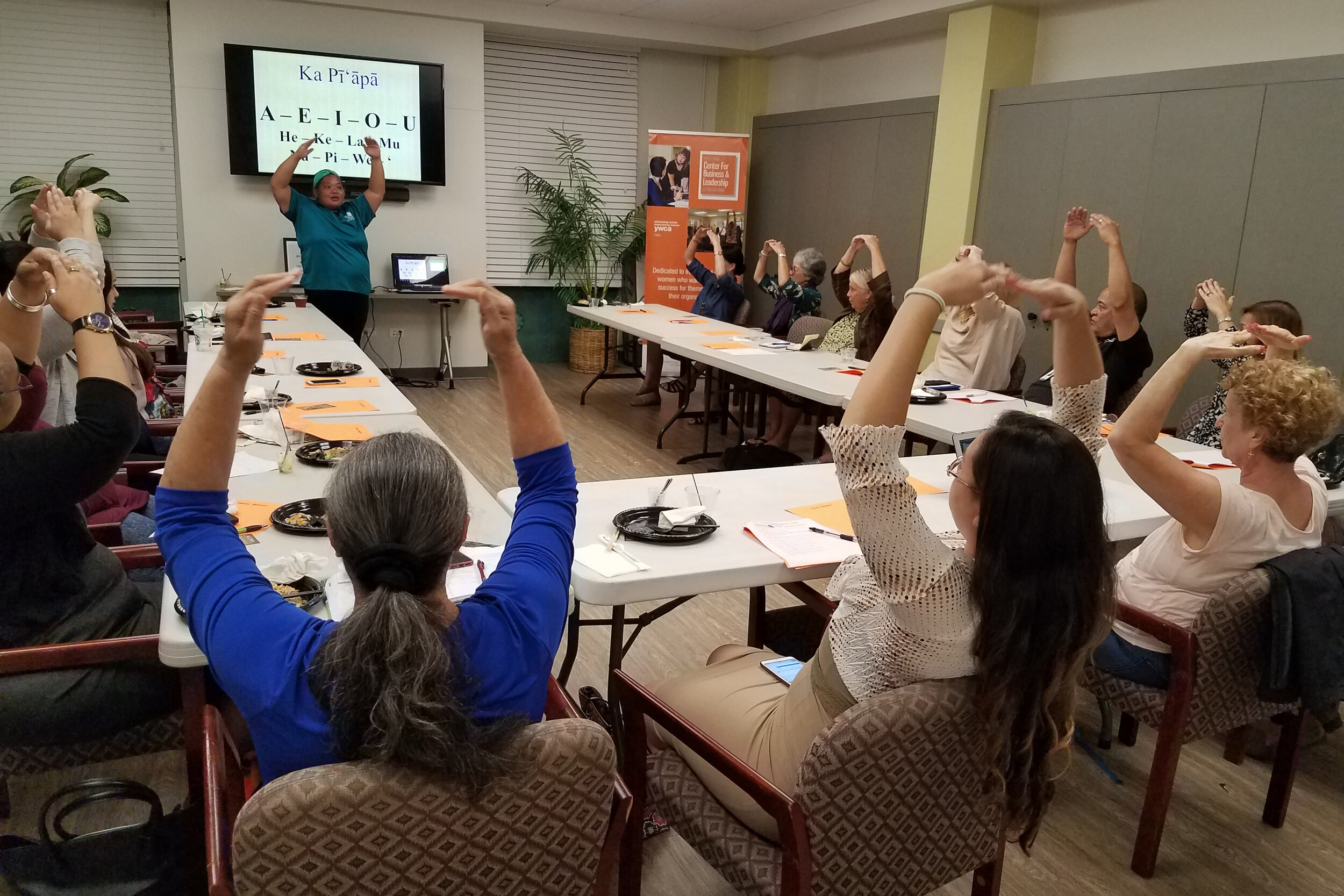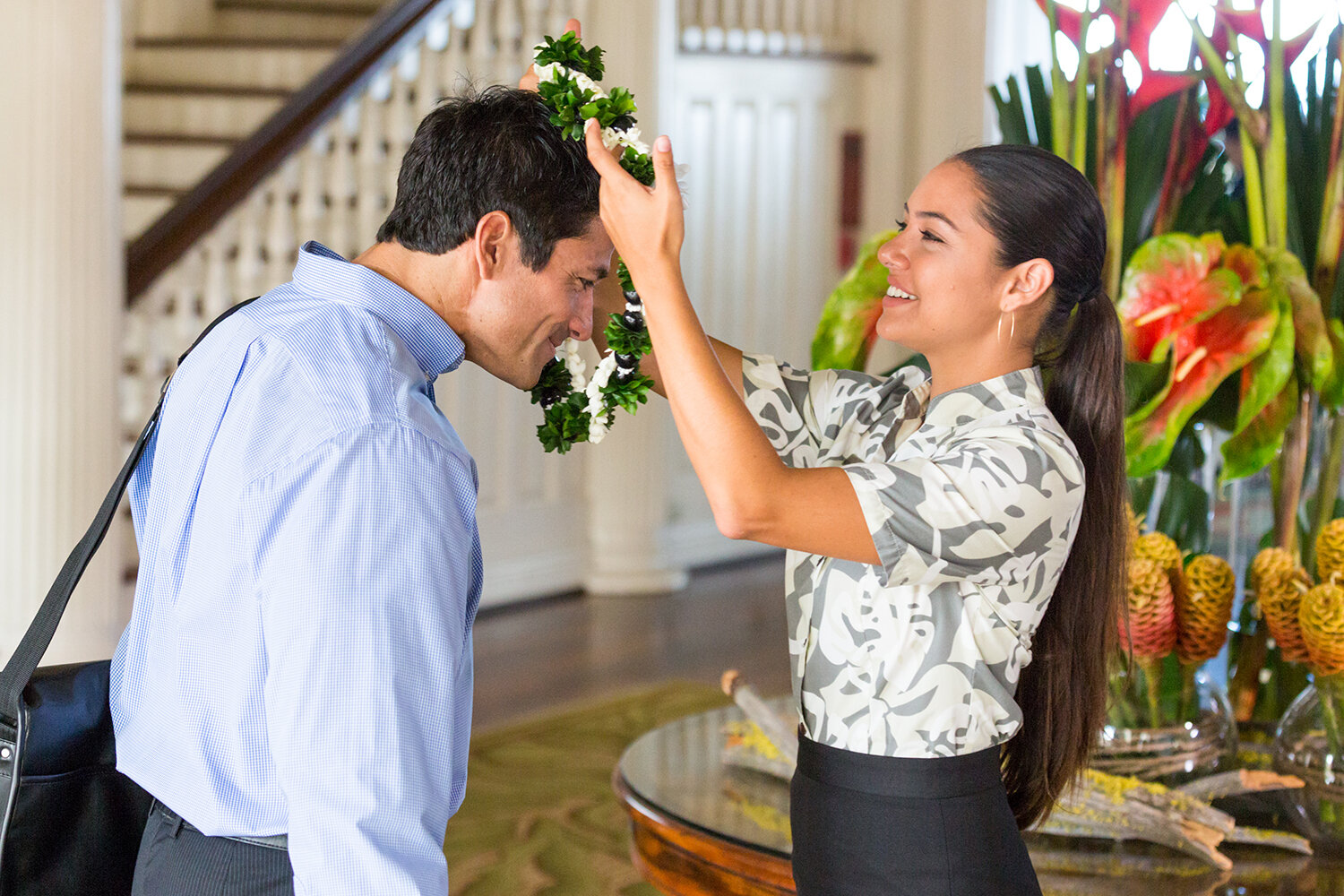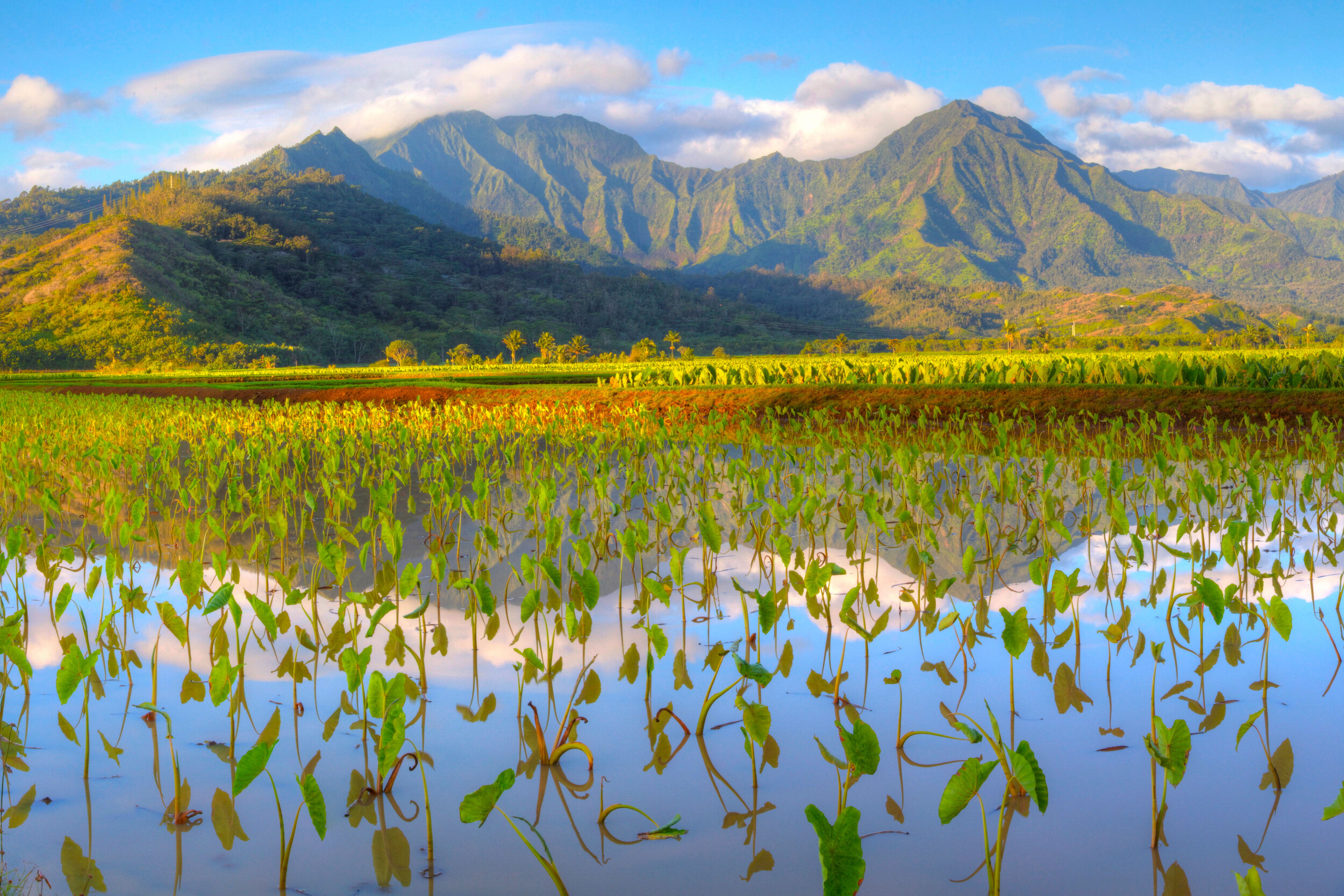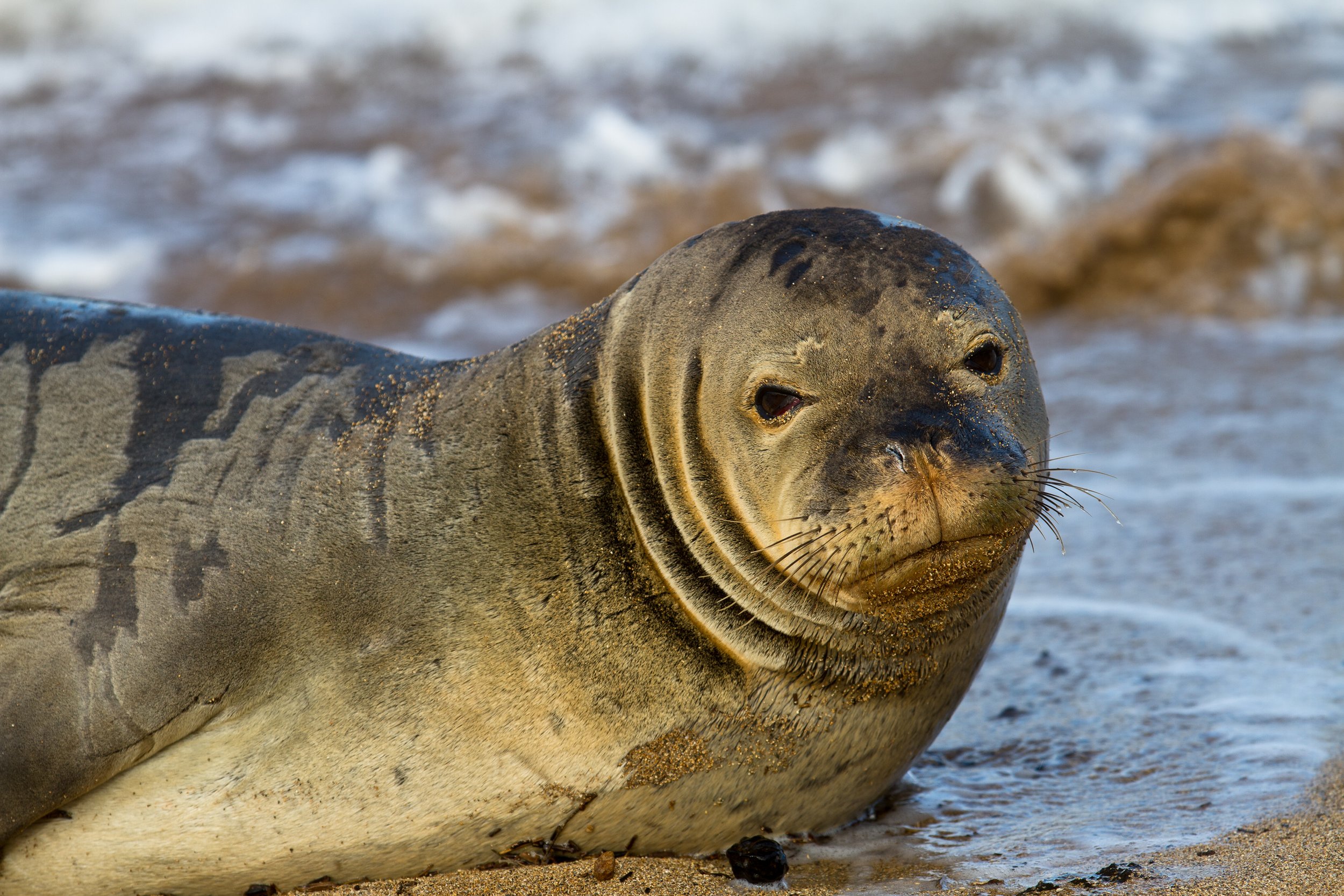NaHHA founder Dr. George Kanahele leads a tour of Waikīkī in NaHHA’s early days.
NaHHA provides cultural training for the visitor industry and beyond.
NaHHA offers a number of training sessions that provide familiarization to the workforce in all industries. In addition, training curriculums can be customized for your business or organization. Our current offerings are listed below. Please email us for more information using the button below.
Introductory Courses
Hoʻokamaʻāina: Building A Relationship With Hawaiʻi
This course is designed to share the foundational values of hosting in Hawaiʻi and is a prerequisite course for other training modules that NaHHA offers. Hoʻokamaʻaina offers an introduction to the core values of hosting in Hawaiʻi and includes deep-dives into the values of aloha, hoʻokipa and kuleana to foster a sense of belonging, encourage personal initiative, and build a collective knowledge of the history of place. This familiarity training will allow participants to grow their relationship with Hawaiʻi in a responsible way.
Duration: 1 Hour 30 Minutes
ʻŌlelo Hawaiʻi - An Introduction to the Hawaiian Language
Language is a tool and a lens through which we can learn, interpret, and activate culture. Examine the rich history of the Hawaiian language and put the basics into practice using the pīʻapā (the Hawaiian alphabet) and tools such as the hakalama pronunciation drills. Normalizing the use of the Hawaiian language is a key component to creating authentic engagement experiences with our visitors and guests.
Duration: 1 Hour
Living Our Values
Aloha
Understand and live a deeper meaning of aloha as taught by Aunty Pilahi Pākī, one of Hawai‘i’s treasured kūpuna (elders). Learn about the foundational values that support aloha. See how the expression of each foundational value in our lives enriches us and others. Explore how aloha is the core of hoʻokipa (customer service and care), and learn how special hospitality can become when you give it spirit; the Aloha Spirit.
Duration: 1 Hour
Hoʻokipa
Hoʻokipa is the Hawaiian value and model of hospitality, one with a unique relationship between host, guest, and place, a relationship that brings with it significant responsibilities for both host and guest.
Duration: 1 Hour
Kuleana
One meaning of kuleana is a small section of land granted to a family to provide for the community’s needs. This system of land tenure provides a model of understanding kuleana as responsibility – a sense of purpose, a good work ethic, accountability, and initiative. Examine examples of kuleana and discuss ways in which the privileges we have in the present, always connect us back to the past.
Duration: 1 Hour
Mahalo
Gratitude is a form of spiritual currency that works quite differently than monetary currency. In the case of gratitude, the more you give away, the richer you become. Become a billionaire in the currency of gratitude by understanding how it creates pilina (connections) between people. Explore the many forms of gratitude: presence, punctuality, recognition, etc.
Duration: 1 Hour.
Pono
Pono is a state of harmony and balance that we should all seek – between man and nature, between individual needs and collective good, between work and family, and so on. Finding that balance within ourselves helps us to find that balance in our families, organizations, and communities.
Duration: 1 Hour.
Activating Our Practices
E Ala Ē
This session is built around an oli (chant) written by Dr. Pualani Kanakaʻole Kanahele, calling upon the sun to arise and awaken, pulling it from the sea, reminding us of our connectivity to elements in nature, especially the sun, and offers a tool for team building and recentering.
Duration: 1 Hour, Early Morning
Kaulana Mahina
Learn the about the cyclical nature of the moon, our ancestral and spiritual connections to this celestial body through the goddess Hinahānaiakalama, as well as how the moon phases act upon living systems and discuss the cycles and seasons of Hawaiʻi.
Duration: 1 Hour
Hula: The Language Of The Heart
Hula is the traditional dance of Hawaiʻi and is the physical interpretation of culture through mind, body and spirit. As a traditional artform, hula is deeply rooted in ritual and ceremony. While hula supports the foundations of our past, it also has been innovated upon in modern times. Learn how hula represents the physical and spiritual connection to the essence of Hawai’i and how the values learned in its practice are deeply rooted in the values of place and the normalization of the Hawaiian language.
Duration: 1 Hour
Hiʻuwai
This session takes place near midnight and focuses attention to spiritual renewal and spiritual cleansing. This practice reminds us of our connectivity to elements in nature, especially the sun, and offers a tool for team building and recentering.
Duration: 1 Hour, Late Night
Makahiki
In ancient times, the celebration of Makahiki was a time to sharpen ones skills, celebrate peace, and set personal and communal restrictions as a means to strive for balance in all areas of life. Learn what Makahiki meant in ancient times, and how the lessons of Makahiki can be applied to our lives in the modern world as a way to mālama, share aloha, and raise our cultural consciousness.
Duration: 1 Hour
Understanding Our Home
In these one-hour sessions, we will learn more about Hawaiʻi. Join us as we take you on huakaʻi (journeys) around Hawaiʻi to learn the cultural stories and history of some of the most beloved, visited, and sometimes misrepresented wahi pana (storied places) in Hawaiʻi.
HAWAIʻI ISLAND
Wahi Pana O Hilo
Hilo has played a role since traditional times as a strong farming and fishing community and boast some of the most spectacular waterfalls, tropical rainforests and breathtaking natural wonders.
Duration: 1 Hour
Hawaiʻi Aloha: A Mele and Tradition
Hawaiʻi Aloha, written by Rev. Lorenzo Lyons, is a song held close to the heart by Native Hawaiians and kamaʻāina (those familiar with Hawaiʻi) alike. Utilized as the closing mele (song) of many Hawaiʻi gatherings by enveloping participants in a lei of aloha, this mele also called Kuʻu One Hānau is a beloved anthem that shares the aloha we all have for Hawaiʻi and is a reminder of the value of aloha we are meant to share with one another. Join us to learn the mele and the deeper meaning of this Hawaiʻi tradition.
Duration: 1 Hour
Wahi Pana O Keauhou
The area of Keauhou in Kona is the birthplace and training ground of royalty, the site of battles that changed the course of history, and a place where pivotal decisions were made to preserve our natural and cultural heritage for the future.
Duration: 1 Hour
Wahi Pana O Kohala
At the north end of Hawaiʻi Island, the district of Kohala is the birthplace of Kamehameha, where he learned diplomacy and warfare, and launched his unification of the Hawaiian Islands. It is also home to one of the oldest heiau (temples) in Hawaiʻi.
Duration: 1 Hour
MAUI
Wahi Pana O Kula
Between east and central Maui is the moku of Kula, the once hiding place of one of the high chiefs of Maui. The largest land district by area, Kula spans from the top of Haleakalā and covers most of the south Maui shore.
Duration: 1 Hour
Wahi Pana O Lāhaina
Learn the multi-faceted history of this area on the northwest side of Maui, best known today for its resorts and visitor attractions, but historically a seat of royal power.
Duration: 1 Hour
Wahi Pana O Wailuku
Between Maui’s majestic mountains is Wailuku, the district that is home to Nā Wai ʻEhā – the four great waters that bring life to the island.
Duration: 1 Hour
OʻAHU
Wahi Pana O Waikīkī
Waikīkī today is the piko (spiritual center) of Hawaiʻi’s visitor industry. But long before visitors began arriving, Waikīkī was a center for royalty, a hub of food production, and a seaside kamaʻāina neighborhood. Explore all these eras in this course.
Presented in three 1-hour zoom sessions.
Visions Of Our Founders
Mālama
Regardless of where we come from or what our DNA says we are, mālama, to take care of something, is an inherent part of Hawaiʻi’s collective consciousness. Pulling from the work of one of NaHHAʻs founding board members and inspired by Senator Kenny Brownʻs Mālama speech given in 1973, the value of mālama acknowledges the need to feel rooted, connected and responsible for our places of origin or the places we call home and sets a course of action where the guiding principles of mālama can be put into daily practice.
Duration: 1 Hour
History of Waikīkī
Examine the cultural, economic and historical evolution of Waikīkī from a small Hawaiian neighborhood to the internationally known visitor destination recognized around the globe. Hear from some of the early visitor industry kūpuna who saw first-hand the role hoʻokipa played in the development of Waikīkī. Discuss Dr. George Kanaheleʻs report Restoring Hawaiianness to Waikīkī authored in 1993 – an effort that in many ways inspired today’s Destination Management Action Plans.
Duration: 1 Hour
Mindful Visiting
Hawaiʻi’s Native Species
Hawai‘i is home to more endangered species than anywhere else in the world. We must be mindful to protect these species and their delicate ecosystems so that future generations may enjoy them. Join us for an exploration of several animals that you may see including the honu (Hawaiian green sea turtle), ‘īlioholoikauaua (Hawaiian monk seal), kōlea (Pacific Golden plover), koholā (Humpback Whale) and many more. We will learn about their habitat, their names, and their unique nature.
Duration: 1 Hour
Waikīkī Historic Trail Walking Tours
Discover historic Waikīkī through an in-person storytelling experience and guided tour. Founded by Dr. George Kanahele and the Waikīkī Historic Trail shares the storied history of Hawaiʻi through the lens of our indigenous stories, cultural history, and geography we mold and carry forth the lessons of our culture not only for our own people but also to share them with our visitors.
Presented in two 1.5 - hour in person tours.
Maʻemaʻe Toolkit
The Hawaiʻi Tourism Authority’s Maʻemaʻe Toolkit serves as a guide to prevent misrepresentation of Hawaiʻi. The toolkit provides essential information needed to accurately and authentically portray The Hawaiian Islands. This session introduces the toolkit and its many resources, from geographical and cultural information, to descriptions of Hawai‘i traditions and customs.
Duration: 1 Hour.
Kuhikuhi: Native Hawaiian Business Directory
Built in partnership with Hawaiʻi’s Native Hawaiian Chambers of Commerce, Hawaiʻi Tourism Authority, Kamehameha Schools, Movers and Shakas, and the Office of Hawaiian Affairs, Kuhikuhi.com is a website that will help direct customers to ʻoihana ʻōiwi – Hawaiian-owned small businesses in our communities. This session is meant to help business owners get listed on Kuhikuhi.
Duration: 30 Minutes
Guest Speaker
NaHHA’s Executive Director, Mālia Sanders was recognized as one of “Hawaiʻi’s 20 For The Next 20” by Hawaiʻi Business Magazine for 2024, which highlights individuals they believe will have a major impact on Hawaiʻi over the next two decades. She was also selected as a Fellow in the 18th cohort of the Pacific Century Fellows Program for 2024. Mālia is a subject matter expert on Regenerative Tourism in Hawaiʻi and holds Professional Certifications in Sustainable Tourism and Destination Management from Cornell University, Sustainable Tourism for Native Nations & Communities from Arizona State University, and Cultural Heritage Tourism through the International Institute of Tourism Studies at the George Washington University.In 2022, Mālia was named as a Social Impact Entrepreneur of the Year for her efforts in “re-imaging Hawaiʻi’s economy with an emphasis on sustainability, innovation and diversification.” Mālia also received a 2022 Pineapple Award in recognition of her contributions to hospitality leadership in Hawaiʻi and was featured as one of American Indian Alaska Native Tourism Association’s Native American Women Leaders in Cultural Heritage Tourism. Mālia is the President of the Hawaiian Civic Club of Honolulu founded by Prince Jonah Kūhiō Kalanianaʻole which has been in existence for over 106 years.
She is a sought after topical expert in the field of Regenerative Tourism as it relates to native communities, cultural programming and community behaviors.
For more information about inviting Mālia Sanders to speak at your event, please email us at info@nahha.com
Student Forum
NaHHA is able to convene between 25-30 Students and their chaperones of either high school or college between the ages of 16-22 who have a background or aptitude in Hawaiian language and/or culture and are considering, are interested in, or desire to hold a future job in Hawaiʻi’s visitor industry.
Participants and their chaperones will engage in a field trip to a Native Hawaiian cultural site and have engaging discussion led by a member of NaHHA’s team which aligns with Regenerative Tourism and learning. Lunch can be added. An afternoon session can be included with a discussion led by a Native Hawaiian community leader or Cultural Director from the Hawaiʻi hospitality industry as a value added conversation on insight to the industry.
Interested students and/or faculty should inquire directly with NaHHA for more information.


